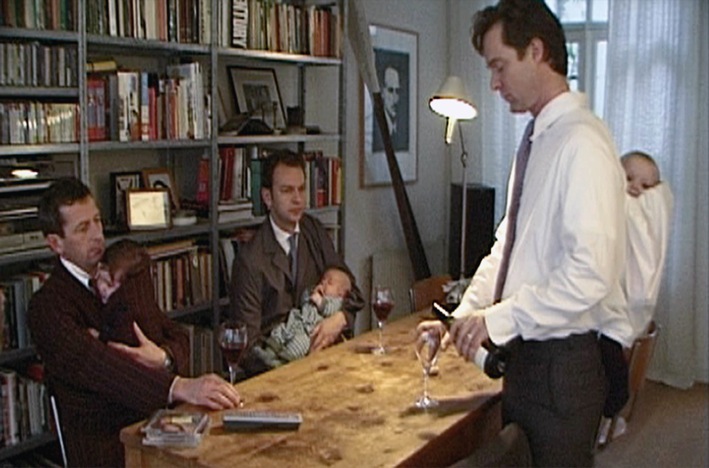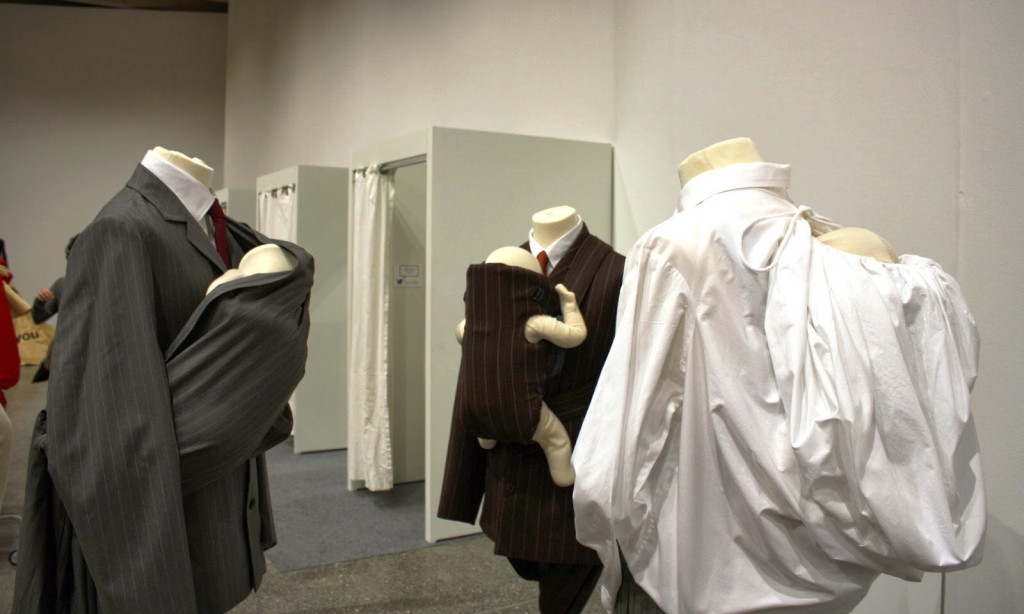Amsterdam , 2004
MAMAMEN
‘I’m working through fashion, which makes it possible to incorporate more and more domesticity in the world of men,’ Alicia Framis explains. ‘The role of men is increasingly expanding into women’s tasks and desires. Not all of them, of course, but there are men who, because of their situation, are single fathers or want to adopt children by themselves, or they are in a homosexual couple, where the role of the mother is in transgression.
‘The suit is always connected to businessmen, men with power, men that belong to a company, men that work for men. At the same time men were deciding, more in the Netherlands than in Spain, to take over roles of women in their private lives. So why not invent the suit that can handle the real life of these men?
‘The reality in Europe is that a lot of fathers and mothers are divorced, that there is a big group of children at school with separated parents. This means that the father has to assume the role of the mother now and than, fulfilling the emptiness, and otherwise, it means the same for the mother.
‘The cliché that the role of men is to make money for the family is now completely passé. Most men have to be active in home and are sometimes alone, or sometimes two men have children, and so on.
‘I thought it was important to invent a suit that matches the new life of men – their needs, their desires. I wanted to make three suits that would make it possible to integrate a baby into the suit, for the men to carry a baby; not like the kind of baby bags we know, but so integrated that the man can wear it to his work. This presented the possibility of creating a new image for men, an image that society actually needs, clothes that truly reflect the daily life of these men.’


‘I’m working through fashion, which makes it possible to incorporate more and more domesticity in the world of men,’ Alicia Framis explains. ‘The role of men is increasingly expanding into women’s tasks and desires. Not all of them, of course, but there are men who, because of their situation, are single fathers or want to adopt children by themselves, or they are in a homosexual couple, where the role of the mother is in transgression.
‘The suit is always connected to businessmen, men with power, men that belong to a company, men that work for men. At the same time men were deciding, more in the Netherlands than in Spain, to take over roles of women in their private lives. So why not invent the suit that can handle the real life of these men?
‘The reality in Europe is that a lot of fathers and mothers are divorced, that there is a big group of children at school with separated parents. This means that the father has to assume the role of the mother now and than, fulfilling the emptiness, and otherwise, it means the same for the mother.
‘The cliché that the role of men is to make money for the family is now completely passé. Most men have to be active in home and are sometimes alone, or sometimes two men have children, and so on.
‘I thought it was important to invent a suit that matches the new life of men – their needs, their desires. I wanted to make three suits that would make it possible to integrate a baby into the suit, for the men to carry a baby; not like the kind of baby bags we know, but so integrated that the man can wear it to his work. This presented the possibility of creating a new image for men, an image that society actually needs, clothes that truly reflect the daily life of these men.’